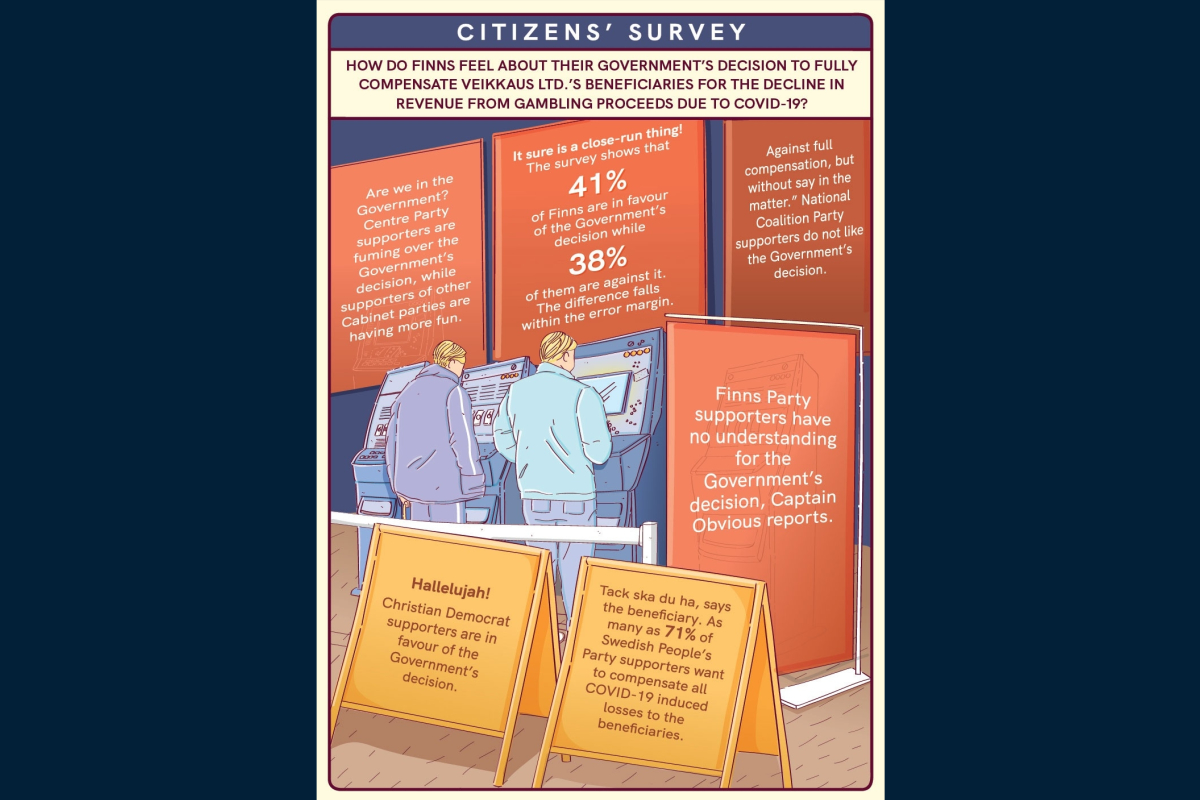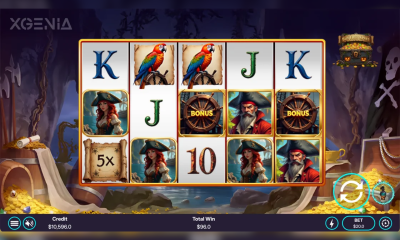Latest News
Survey: Supporters of Centre Party, Finns Party and National Coalition Party are against the Government’s decision concerning Veikkaus Ltd

The Finnish Government’s decision to make budget appropriations in order to fully compensate Veikkaus Ltd.’s beneficiaries for the decline in Veikkaus’s revenue from gambling divides the Finnish people into two, almost equal-sized opposing camps, as indicated by the survey commissioned from Bilendi Oy.
Finns are split almost exactly in half over whether or not the Finnish Government reached the right solution in deciding to make budget appropriations to fully compensate Veikkaus Ltd.’s beneficiaries for the decline in Veikkaus’s revenue from gambling in 2020.
In March this year, Veikkaus Ltd, the government-owned betting agency that holds a monopoly in Finland, shut down its gambling machines in grocery stores, convenience stores, restaurants and petrol stations due to the coronavirus crisis. Additionally, sports betting has faced an exceptional situation, as many popular sports have temporarily ceased.
41% of Finns are in favour of the Government’s decision to fully compensate the beneficiaries for the decline in revenue, while 38% of them are against it. The rest cannot say how they feel about it.
These are some of the findings of a survey conducted by the market research company Bilendi Oy as part of its M3 Panel, a nationwide consumer panel, between 10 and 13 July 2020, on commission by Kasino Curt, the gambling information website (https://kasinocurt.com/). The margin of error in the survey is ±3.1 percentage points. A total of 1,000 Finnish adults responded to the survey, and the sample was weighted by age, gender and place of residence to represent the Finnish population on a national scale.
Out of all parties’ supporters, the decision by the Government headed by Prime Minister Sanna Marin arouses the most opposition among Finns Party voters, of whom just 31 percent relate favourably to it. Out of the Cabinet parties’ supporters, Centre Party voters are against the Government’s decision; merely 37 percent of them are in favour of it. Likewise, supporters of the National Coalition Party and the minor parties are against the Government’s decision.
“On the whole, the difference between the support and opposition is so small that it falls within the margin of error. However, different age groups relate very differently to the matter. The 18-24-year-olds feel most negatively about the decision, whereas among the 45-54-year-olds, as many as 47 percent consider the decision a good one,” says Janne Juntunen, Senior Client Service Manager for Bilendi Oy.
Gambling machines in grocery stores: a sign of the post-COVID-19 era?
In June, Veikkaus publicly announced it will restart the gambling machines on 15 July. Veikkaus also announced it will do so with attention to the health risks caused by COVID-19, which seems to have convinced the Finnish people.
According to Kasino Curt’s survey, 46% of Finns approve of Veikkaus’s decision to turn the gambling machines back on while 30% of them disapprove of it. The rest cannot say how they feel about it.
“The coronavirus epidemic was not mentioned in conjunction with the survey for impartiality reasons, but the respondents may have thought that the restart of Veikkaus’s gambling machines is a sign of the post-COVID-19 era,” Juntunen mentions.
Last year, Kasino Curt commissioned two similar surveys from Bilendi. The findings of these surveys indicated that more Finns support than oppose the idea of abolishing Finland’s gambling monopoly and adopting a gambling licence system and that Finns are suspicious of the Finnish MPs’ motives in gambling matters.
The results of all the three surveys are still available online at https://kasinocurt.com.
Listed below are the statements of the most recent survey and those responses that indicated agreement or disagreement with them (that is to say, the responses “Cannot say” are not included in the listing):
- In March this year, Veikkaus Ltd shut down its gambling machines in grocery stores, convenience stores, restaurants and petrol stations. On 15 July, Veikkaus will turn the gambling machines back on. In my opinion, the decision to restart the gambling machines is the right one. Agree 46%, disagree 30%.
- The Finnish Government has decided to make budget appropriations in order to fully compensate Veikkaus Ltd.’s beneficiaries for the decline in Veikkaus’s revenue from gambling in 2020. In my opinion, this is right. (The beneficiaries are represented by a number of organisations.) Agree 41%, disagree 38%.
Powered by WPeMatico
AI gaming platforms
BetConstruct AI Sets the Tone for 2026 iGaming with Harmony Choice Event in Barcelona
Casino Technology
Danny Wu Wins Cubeia’s ICE Barcelona VIP Poker Tournament Featuring Henrik Larsson & Johan Mjällby

Danny Wu triumphs at Cubeia’s ICE Barcelona VIP Poker Tournament
Cubeia, the Sweden-based iGaming software solutions provider, has announced Danny Wu as the winner of its inaugural ICE Barcelona VIP Poker Tournament, held in partnership with QTech Games. The standout event featured a special table that included Swedish football icons Henrik Larsson and Johan Mjällby, drawing significant attention from ICE attendees.
A high-profile showdown at ICE Barcelona
Hosted on Day 2 at Cubeia’s eye-catching stand, the VIP poker tournament quickly became a focal point of the exhibition floor. Danny Wu emerged victorious after an entertaining and competitive session, taking home the top prize of €1,500.
The table combined serious poker action with relaxed conversation, as players swapped hands and shared football stories, creating an atmosphere that resonated with both poker enthusiasts and industry professionals.
A premium VIP experience
Cubeia elevated the experience with a curated VIP setting, complete with champagne and beer, reinforcing the social and celebratory tone of the event. The lively ambience helped generate buzz throughout the day and showcased Cubeia’s ability to deliver memorable, community-driven activations at major industry events.
Spotlight on Cubeia Originals
Alongside the tournament, visitors explored Cubeia’s Originals portfolio, including upcoming titles such as Chicken Cross Tower, Multiplier Roulette, Baccarat, Blackjack, and Snakes. The showcase highlighted Cubeia’s commitment to innovative content and engaging game mechanics.
Industry praise
Tove Nilsson, Marketing & Event Coordinator at Cubeia, commented:
“The VIP Poker Tournament exceeded all expectations and was a major highlight of ICE Barcelona. Working with our partners, QTech Games, we delivered a truly premium experience. The atmosphere around the table was exactly what we hoped for — competitive, social, and genuinely fun. Congratulations to Danny on a deserved win, and huge thanks to Henrik Larsson and Johan Mjällby for being such great sports.”
Bringing the industry together
The success of the ICE Barcelona VIP Poker Tournament underlines Cubeia’s strength in creating unique, high-impact experiences that connect partners, players, and visitors. By blending celebrity appeal, quality gameplay, and premium hospitality, Cubeia reinforced its position as a brand that values community and innovation within the iGaming industry.
The post Danny Wu Wins Cubeia’s ICE Barcelona VIP Poker Tournament Featuring Henrik Larsson & Johan Mjällby appeared first on Eastern European Gaming | Global iGaming & Tech Intelligence Hub.
affiliate marketing
N1 Partners Takes Flight in Barcelona: Helicopter Awarded at iGB Affiliate 2026 Finale

The curtains have closed on iGB Affiliate 2026, but the echoes of N1 Partners’ massive presence are still vibrating through the halls of the Fira de Barcelona. After two days of high-stakes networking and over 500 business meetings, the company concluded the event by awarding a Robinson R22 Beta II helicopter to the grand winner of the N1 Puzzle Promo.
A Hub of Industry Activity
From January 20 to 21, the N1 Partners stand (80-C80) served as a primary nervous system for the expo floor. The team maintained a relentless pace, facilitating hundreds of discussions regarding traffic strategies and custom deals.
Beyond the boardroom-style meetings, the stand offered a more interactive “Plinko” activity and distributed over 300 branded merchandise packs, ensuring the N1 brand remained visible across the entire conference.
Media Spotlight and Thought Leadership
The company’s influence extended beyond the booth, with leadership participating in more than 10 interviews and podcasts. These sessions focused on sustainable growth within the iGaming sector and evolving affiliate expectations, further solidifying N1 Partners’ reputation as a transparent and performance-driven program.
The Grand Finale: A Night to Remember
The highlight of the week was undoubtedly the N1 Puzzle Promo Party, an exclusive, closed-format celebration that saw over 2,000 registrations. While only 600 guests could be accommodated, the venue was packed with the industry’s top decision-makers and affiliates.
The atmosphere reached a fever pitch as the winners of the N1 Puzzle Promo leaderboard were announced:
| Rank | Partner Name |
| 1st Place (Helicopter Winner) | Cash Splash |
| 2nd Place | Advertise |
| 3rd Place | Traffic Squad |
| 4th Place | Seven Group |
| 5th Place | Alfaleads Network |
The evening concluded with a live performance from a surprise headline guest and high-energy DJ sets, marking the successful end of a campaign that was recently named Best Advertising and Marketing Campaign at the European iGaming Awards.
The post N1 Partners Takes Flight in Barcelona: Helicopter Awarded at iGB Affiliate 2026 Finale appeared first on Eastern European Gaming | Global iGaming & Tech Intelligence Hub.
-

 AI4 days ago
AI4 days agoPrimero Games Uses XGENIA for Their First AI-Generated Slot Game
-

 Africa7 days ago
Africa7 days agoLogifuture’s Simulate Forecasts Morocco AFCON Glory After 1,000 Final Simulations
-

 Balkans4 days ago
Balkans4 days agoKiril Kirilov takes on new leadership role at CT Interactive
-

 Baltic Tech Week4 days ago
Baltic Tech Week4 days agoHIPTHER Baltics Announces Riga Event and Strategic Partnership with LexLegas
-

 ALGS 2026 Championship4 days ago
ALGS 2026 Championship4 days agoS8UL Esports secures historic top five finish at ALGS 2026 Championship; bags INR 1 crore in prize money
-

 Compliance Updates4 days ago
Compliance Updates4 days agoSEON Launches Identity Verification Built on Real-Time Fraud Intelligence
-

 crypto sports betting7 days ago
crypto sports betting7 days agoMash.fun Expands Crypto Sports Betting with Player Props, Hits $1 Million in Trading Volume
-

 College Sport Prediction Markets4 days ago
College Sport Prediction Markets4 days agoNCAA Urges CFTC to Suspend College Sport Prediction Markets


























